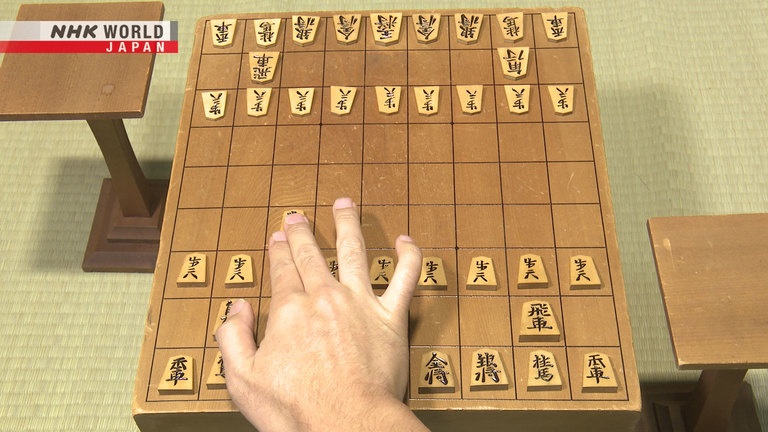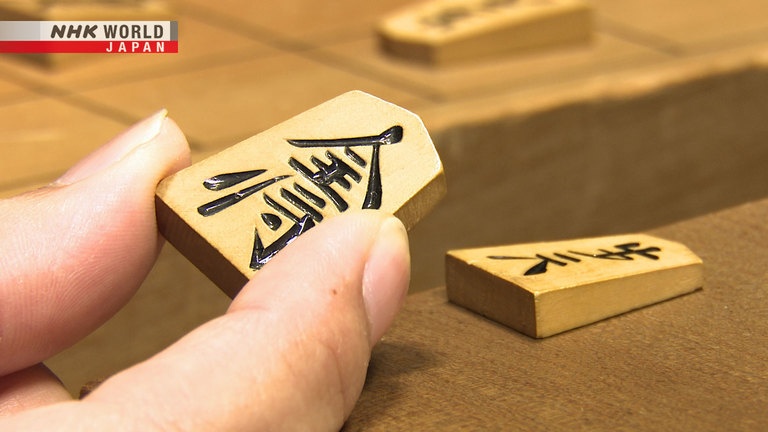Shogi
The Japanese language is rich in words and expressions influenced by nature, history and culture. This episode looks at words related to shogi, also known as Japanese chess. Shogi is believed to have originated in ancient India, and shares roots with Western chess. The game has been enjoyed in Japan for more than 1,000 years. Many of the expressions born from shogi are used widely today in business and daily conversation. From his home in Kyoto Prefecture, poet and literary translator Peter MacMillan guides us through these words and the culture behind them.




Transcript
"Yukigesho."
"Karakurenai."
The Japanese language is rich in unique expressions that reflect nature and culture.
Magical Japanese.
Today's theme is "shogi."
Commonly referred to as Japanese chess, this board game has been enjoyed in Japan for more than 1,000 years.
It's believed to have originated in ancient India, and shares roots with Western chess.
Hello, I'm Peter MacMillan.
Shogi is a game similar to chess, whereby if one takes the opponent's "gyoku," or king, one wins the game.
In the Edo period, the Shogunate supported shogi by hiring professional shogi players to study the game and spread it amongst the people.
They held yearly shogi tournaments in front of the lords, and shogi gradually became a national pastime.
Many of the expressions born from shogi are used widely today in business and daily conversation.
"ote o kakeru."
"Ote" is the final move before a player takes the opponent's king.
In chess, this is called a check.
In conversation, "ote o kakeru" means to make a move that puts your opponent in check.
In other words, you are getting increasingly close to victory or success.
One more win and they'll be "ote o kakeru" - one step away - from clinching the championship!
"ote o kakeru."
"matta nashi."
In shogi, "matta" is the act of replacing your previous move with a different one, and "nashi" means is not possible.
From this, "matta nashi" is used to mean that something is at a critical point and there is no time for second chances.
I think I can brush up my proposal further.
Could you give me a few more days?
Unfortunately, the schedule has changed and we're meeting
the client tomorrow. Please work on it "matta nashi" - without delay.
"matta nashi."
If someone does a "matta," or retracts their move in a formal shogi match, they are automatically disqualified.
But, if you don't want to come off as being inflexible, it's better to allow "matta" when playing the game with your friends.
Something interesting to note is the name for shogi pieces in Japanese, "koma," which has its roots in horses.
It evokes the image of a soldier fighting on his horse.
Shogi "koma" are actually very similar to chess pieces.
"Gyoku" - like a king in chess, "gyoku" can move one square in any direction.
"Fu" - this corresponds to a pawn, except that it only moves forward and not diagonally.
"Hisha" - this moves like a rook in chess, in four directions.
There is no queen in shogi like there is in chess, but there are also some pieces that are not found in chess and are unique to shogi.
One of them is the "kin."
It can move one square at a time in six directions.
The "kin" is good for both attacks and defense.
Here is a word related to "kin."
"narikin."
Just like a pawn in chess can be promoted to a queen, the pieces in shogi can be promoted to have different powers after penetrating the enemy's territory.
This promotion is called "nari."
The promotion of a "fu" to a "kin" is called "narikin."
While a "fu" can only move straight forward, a "kin" can move in six directions.
From this, "narikin" came to describe a financial windfall, or someone who suddenly becomes rich.
Generally, it has a disapproving tone. For example: I heard he got another car.
He must be really successful.
He's just a "narikin" - new money. But money isn't everything, you know.
"narikin."
"takabisha."
"Taka" in shogi refers to a position close to the opponent's territory.
"Bisha" comes from "hisha," one of the shogi pieces.
"Takabisha" is an offensive strategy where you place your "hisha" right in front of enemy territory.
From this, the phrase came to describe an overbearing or arrogant attitude.
Everyone says she's hard to work with.
Maybe it's because she's so "takabisha" - arrogant.
"takabisha."
"Narikin" and "takabisha" are negative expressions and you shouldn't say them directly to anybody unless you want to make them angry.
The outcome of the game depends on how the pieces are played.
Let's have a look at some words that came about from different plays.
"sutegoma."
"Sute" means to throw away, and "goma" is derived from "koma."
"Sutegoma" is a piece you strategically surrender to the enemy to gain the advantage in the game.
The word is also used figuratively for people who are sacrificed for the benefit of their organization or other causes.
You're the only one who can do this task.
But it's very demanding...
I accept my fate. I'll be a "sutegoma" - sacrificial pawn - for the company.
"sutegoma."
"Sutegoma" sounds kind of pitiful, but shogi gives them another chance.
"mochigoma."
"Mochigoma" literally means the pieces, or "koma," that you own.
Unlike chess, in shogi, players can use captured pieces as their own in later moves.
From this, "mochigoma" also came to mean resources that are at your disposal.
I wish I had as many talented employees as you do.
I don't have enough "mochigoma" - human resources - available.
"mochigoma."
A soldier who betrays his own player upon being captured by his opponent may seem like a coward, but if you think about it, "mochigoma" is like a consolation match for the soldier who was captured.
He is given another chance to shine.
It's an interesting system - almost like a model for human resources.
Of course, as with any game, a good start to the match is essential for success.
"sente o utsu."
"Sente" is the first move and "utsu" means to place a piece on the board.
"Sente o utsu" means making the first move in the game, and this is generally said to be advantageous.
From this, the phrase is used when you act ahead of others, or prepare in advance to get ahead.
Oh, no. I heard someone is trying to propose to her.
You need to "sente o utsu" - make a move ahead of the others.
"sente o utsu."
Today, we looked at many phrases related to shogi.
It's surprising how many of them can be applied to life too.
See you next time! Bye!